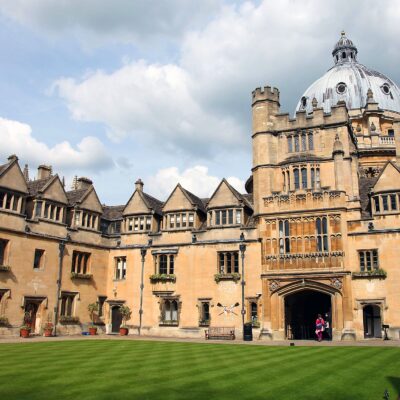‘Challenges for an Oxford College’ by member and Principal, Brasenose College, John Bowers
I enjoyed my time as a barrister but was ready for a change when I applied to be Principal. When I got to Oxford I liked the people, the place, the ambience, the intellectual feel, the food and the informal style of doing business. The beauty of the centre of Oxford where the College is situated is just breathtaking.
When applying, I had the singular disadvantage of being an alumnus of Lincoln College with which Brasenose shares a boundary. There was some traditional animus between the two Colleges, apparently dating back centuries to an occasion when one of the Colleges allegedly refused sanctuary to a student of the other after which he was trampled by a Town mob.
The College is a self-governing institution. We are a democracy like a Greek city state. Any issue can be taken to Governing Body which consists of the Tutorial Fellows, a few Supernumerary Fellows and College officers such as the Bursar and Senior Tutor. One wag told me that as a Head of House, you are the last amongst equals. I would not go as far as that or the advice which apparently Geoffrey Warnock (Principal of Hertford College) gave to his wife when she was appointed Head of House that: if you ever want something to happen never let it be known you do. I do however take as a mantra what Abigail Van Buren, US advice columnist said: “the less you talk the more you are listened to”
My main priorities as I said in my Inauguration were and are widening access, increasing diversity, and academic success. As of 2019 admissions, 74.9% were from state schools which is a major increase over previous years. Often the admissions decisions are difficult and knife-edge. Those who criticise from the outside have little idea of the care that goes into making the choices. This year we had 23,020 students applying for 3,300 places. There are often tiny differences in marks between students. What is important is that students are assessed on their promise and not whether they are sufficiently polished at the interview and this is appreciated by all those who carry out admission interviews. We also must not discriminate against those from public schools or allow the impression to take hold that they are not welcome to apply.
Equality in a University is clearly crucial – academic excellence has to be predicated on ensuring that candidates with the most potential have equal opportunity, regardless of background. If we are missing talent, we are failing to secure the most promising students. Brasenose and the wider University offer an extraordinary education but one which should be for the public benefit and it is important that this goes to the most talented and committed students, not disproportionately to the already privileged or simply the best prepared (or those displaying the most polish at interview). They may sometimes superficially appear to be the easiest to teach.
Diversity, placing a positive value on differences, is also important as it secures the best conditions for learning – students gain the benefit of a wealth of different outlooks, and learn much from each other and it creates a stronger community. Merit is however the key feature which we must always promote. Disaster lies if we move away from this as our bedrock.
The proportion of those arriving from state schools is rising and we may never reach the same level as in the sixth form population (let alone the proportions in secondary schools as a whole) however much we try. We cannot alone as a University or College, right the wrongs of the whole education system.
As to promoting diversity, we have made some progress, appointing four more women in Governing Body Fellowships in my time, two of whom are BME but clearly we need to make further progress. We are however limited in what we can do and how fast we can do it by the fact that few Fellowships are likely to become vacant in any one year and we must also appoint to them on academic merit.
We as a College always do our best to seek to ensure that University Appointment Panels are aware of our keen interest in diversity and put forward our ideas on diversity in particular so as to ensure we gain the widest diversity of field for each Fellowship (for example by outreach advertising).
As to academic success (which is and must be our core business), this is more difficult to plan for and to predict. In my first three years we came 7th in Norrington Table of exam success of the different Colleges but then slipped down in year four for reasons that remain obscure. We ensure that academic success is at the top of the agenda in everything we do. Happily, our application rates are high (not least because we are known as a happy College and a central one too) and the scores on most student satisfaction surveys are very high.
There is clearly a great weight of history resting on my shoulders (to coin a Blairite phrase). As a Jew I could not have been head of house for the vast majority of the life of the College. In general, I believe that we must learn from our history but not be beholden to it. It should not stultify reform and we must put the interests of the students first.
I miss the visits which we would make in normal times; we regularly go to New York and Hong Kong and have been also to Boston, Los Angeles, San Francisco, Tokyo and Naples in Florida. Most of all I miss the people at College.



